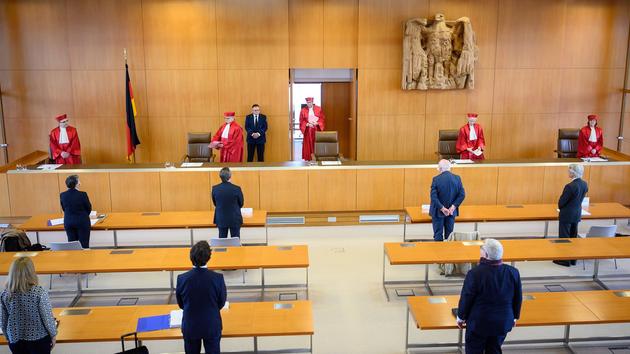Europe did not need that. To the health, economic, political and potentially financial crisis, is added, by the coincidence of the calendar, a constitutional crisis likely to shake the foundations of the euro. The German constitutional court in Karlsruhe on Tuesday issued an explosive judgment for the functioning of the European Central Bank (ECB).
Read also: Faced with an "unprecedented" crisis, the ECB is ready to increase the power of its financial bazooka
Solicited by a complaint from a German economics professor about the legality of its quantitative easing program , it gave the ECB three months to justify it. Otherwise, it will order the Bundesbank (first shareholder of the ECB) to withdraw from it and resell the 534 billion euros of public bonds it held in its name at the end of April.
This German judgment is a small bomb dropped in a Europe already in bad shape. On the merits, the court may have dismissed the plaintiffs, holding that the action of the ECB did not amount to direct funding to the States and therefore did not contravene the European treaties, it was in its arguments that it challenged has been the pillar of European monetary policy for years. A new episode in an old soap opera between the German justice, in the name of small porters who feel aggrieved, and the community institution yet installed on its soil, in Frankfurt. Already in 2014, the Bundesbank governor, Jens Weidmann, had testified in Karlsruhe against the ECB, where he sits on the board of governors. But the court then ended up agreeing with an opinion of the European Court of Justice on the legality of financial instruments (OMT), created during the euro crisis, never used.
Italian debt buy-back
This time, she overruled a 2018 Luxembourg court judgment, which she described as "incomprehensible". German judges thus find a way to challenge both the independence of the ECB and the supremacy of Community law.
On the economic front, this decision threatens the action of the ECB in the most violent economic crisis since the Second World War. It attacks the policy of buying back public assets from the Central Bank, whose “proportionality” it doubts in relation to the weight of each Member State in its capital. In practice, the ECB holds around a quarter of European public debt, a figure which is set to rise sharply to support the economies of the euro zone at arm's length. It holds around 31% of German debt (via the Bundesbank) and 20% of Italian debt. All this, while respecting a ceiling of 33% of the national debt of each country, and in proportion to their respective shares in its capital.
Read also: How the ECB sucks the debts of the States in the crisis
However, since the beginning of the pandemic, the ECB, under the aegis of Christine Lagarde, has launched a huge 750 billion euro debt buy-back program (PEPP), by freeing itself from these constraints of proportionality by country . It buys much more Italian, French or Spanish debt, than German or Dutch. A way to compensate for the absence of a coordinated response from the member states of the euro zone and their dissension on the idea of issuing mutual debts (coronabonds). This intervention on the pandemic is not directly concerned by the Karlsruhe judgment, but it is very likely to be attacked in turn on the same basis. However, without the action of the ECB, the countries of the euro zone no longer have a lender of last resort capable of assuming their debt in the face of the crisis.
As a result, the spread between Italian and German rates widened again on Tuesday as the euro fell against the dollar. An ECB monetary policy council met urgently in the evening to review the judgment.

